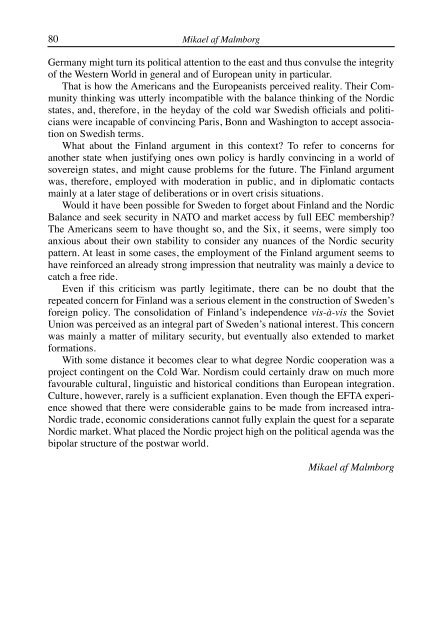80Mikael af MalmborgGermany might turn its political attention to the east and thus convulse the integrity<strong>of</strong> the Western World in general and <strong>of</strong> <strong>European</strong> unity in particular.That is how the Americans and the <strong>European</strong>ists perceived reality. Their Communitythinking was utterly incompatible with the balance thinking <strong>of</strong> the Nordicstates, and, therefore, in the heyday <strong>of</strong> the cold war Swedish <strong>of</strong>ficials and politicianswere incapable <strong>of</strong> convincing Paris, Bonn and Washington to accept associationon Swedish terms.What about the Finland argument in this context? To refer to concerns foranother state when justifying ones own policy is hardly convincing in a world <strong>of</strong>sovereign states, and might cause problems for the future. The Finland argumentwas, therefore, employed with mo<strong>de</strong>ration in public, and in diplomatic contactsmainly at a later stage <strong>of</strong> <strong>de</strong>liberations or in overt crisis situations.Would it have been possible for Swe<strong>de</strong>n to forget about Finland and the NordicBalance and seek security in NATO and market access by full EEC membership?The Americans seem to have thought so, and the Six, it seems, were simply tooanxious about their own stability to consi<strong>de</strong>r any nuances <strong>of</strong> the Nordic securitypattern. At least in some cases, the employment <strong>of</strong> the Finland argument seems tohave reinforced an already strong impression that neutrality was mainly a <strong>de</strong>vice tocatch a free ri<strong>de</strong>.Even if this criticism was partly legitimate, there can be no doubt that therepeated concern for Finland was a serious element in the construction <strong>of</strong> Swe<strong>de</strong>n’sforeign policy. The consolidation <strong>of</strong> Finland’s in<strong>de</strong>pen<strong>de</strong>nce vis-à-vis the SovietUnion was perceived as an integral part <strong>of</strong> Swe<strong>de</strong>n’s national interest. This concernwas mainly a matter <strong>of</strong> military security, but eventually also exten<strong>de</strong>d to marketformations.With some distance it becomes clear to what <strong>de</strong>gree Nordic cooperation was aproject contingent on the Cold War. Nordism could certainly draw on much morefavourable cultural, linguistic and historical conditions than <strong>European</strong> integration.Culture, however, rarely is a sufficient explanation. Even though the EFTA experienceshowed that there were consi<strong>de</strong>rable gains to be ma<strong>de</strong> from increased intra-Nordic tra<strong>de</strong>, economic consi<strong>de</strong>rations cannot fully explain the quest for a separateNordic market. What placed the Nordic project high on the political agenda was thebipolar structure <strong>of</strong> the postwar world.Mikael af Malmborg
Dieses Dokument wur<strong>de</strong> erstellt mit FrameMaker 4.0.4.The Diplomacy <strong>of</strong> ‘dignified calm’ 81The Diplomacy <strong>of</strong> ‘Dignified Calm’An Analysis <strong>of</strong> Ireland's Application for Membership <strong>of</strong> the EEC1961 <strong>–</strong> 1963Dermot KeoghIntroductionThe closure <strong>of</strong> most <strong>of</strong> the <strong>of</strong>ficial archives <strong>of</strong> the Irish state until the early 1990s,when a 30-year rule was first introduced, has resulted in the relative un<strong>de</strong>r<strong>de</strong>velopment<strong>of</strong> contemporary Irish history in comparison with the level <strong>of</strong> specialisationand publication in the majority <strong>of</strong> other countries in the <strong>European</strong> Union (EU). Thelarge number <strong>of</strong> national and comparative studies on the first unsuccessful attemptat enlargement in 1962 <strong>de</strong>monstrates the advanced state <strong>of</strong> scholarship in manycountries on that topic. 1 In contrast, the study <strong>of</strong> Irish history in the 1950s and1960s based on <strong>of</strong>ficial archives <strong>–</strong> including the country's relationship with the<strong>European</strong> Economic Community (EEC) <strong>–</strong> has only got un<strong>de</strong>r way in the mid-1990s. 2 This work has not caught up with research in comparable countries inEurope. 3This article, using the files <strong>of</strong> the Departments <strong>of</strong> the Taoiseach [Prime Minister]and External Affairs [renamed Foreign Affairs in the 1970s] and interviewswith Irish participants, will first examine the background to Ireland's shift in policyfrom protectionism towards free tra<strong>de</strong> at the end <strong>of</strong> the 1950s. It will then trace theIrish policy and <strong>de</strong>cision-making process from the time <strong>of</strong> application in mid-1961to <strong>de</strong> Gaulle's veto <strong>of</strong> British membership in January 1963. A small group <strong>of</strong> politiciansand senior civil servants were responsible for the drafting and management <strong>of</strong>the application for membership and for the subsequent round <strong>of</strong> discussions whicheventually resulted in a positive <strong>de</strong>cision to allow Ireland to enter negotiations on1. As an example <strong>of</strong> this scholarship, see A. DEIGHTON (ed.), Building Postwar Europe <strong>–</strong> NationalDecision-Makers and <strong>European</strong> Institutions, 1948-1963, London 1995; See also Proceedings <strong>of</strong> theconference “Acceleration, Deepening and Enlarging: the <strong>European</strong> Economic Community, 1957-1963,” organised by A. Deighton and A. Milward, St Antony's, Oxford, 21 -24 March 1996.2. But overall, however, research in this area is in the very early stages. The first study, based on therecords <strong>of</strong> the Department <strong>of</strong> Finance, was written by a former <strong>of</strong>ficial and participant in the negotiations<strong>of</strong> 1972. See D. J. MAHER, The Tortuous Path: The Course <strong>of</strong> Ireland's entry into the EEC1948-1973, Dublin 1986. Some background material <strong>of</strong> relevance may also be found in Ronan Fanning's<strong>of</strong>ficial history <strong>of</strong> the Department <strong>of</strong> Finance, The Irish Department <strong>of</strong> Finance 1922-1958,Dublin 1978. See also my general survey, Ireland and Europe, 1919-1989, Cork and Dublin 1990.3. Two young scholars have been working on doctoral topics in the general area. Both M. Fitzgerald,Department <strong>of</strong> <strong>History</strong> and Civilisation, <strong>European</strong> University Institute, and P. w. Bower, Department<strong>of</strong> <strong>History</strong>, University College Cork are working on doctoral theses in this general area.
















